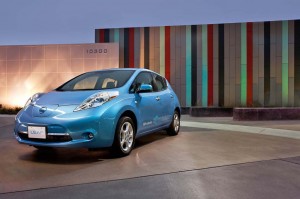
Nissan is facing a class-action lawsuit by California and Arizona residents who claim the automaker's advertising for the Leaf misled buyers over the vehicle's driving range.
A group of consumers has filed a class-action lawsuit against Nissan accusing the automaker of overstating the vehicle’s driving range.
Humberto Klee, a plaintiff from California, claims that Nissan advertises the Leaf’s driving range at 100 miles or less, depending on variables such as weather, driving style and road conditions. But Nissan doesn’t disclose that the 100-mile range is only possible when the battery is charged to 100% of its capacity, something Nissan discourages owners from doing because it could damage the battery.
“Before purchase or lease, Nissan failed to disclose its own recommendations that owners avoid charging the battery beyond 80% in order to mitigate battery damage and failed to disclose that Nissan’s estimated 100-mile range was based on a full charge battery, which is contrary to Nissan’s own recommendation for battery charging,” the lawsuit says.
Nissan also didn’t disclose that the battery system could cause the Leaf to suffer premature and severe loss of driving range, capacity and battery life.
The class includes California and Arizona residents who purchased or leased 2011 or 2012 Leafs. The suit asks for Nissan to replace the cars’ battery systems with a suitable alternative product, to reform the Leaf’s warranty, cover the loss of battery capacity under warranty and reimburse class members for repairs.
Klee claims that Nissan violated California’s Consumer Legal Remedies Act and Arizona’s Consumer Fraud Act and Unfair Business Act and breach of implied warranty under the Song-Beverly Consumer Warranty Act.
Nissan said in a statement that “the lawsuit lacks merit.”
The company said it regrets that a “very small number of Leaf owners are dissatisfied.”
“Leaf customers are some of Nissan’s most satisfied,” the statement says. “Just as a pickup truck or a sports car isn’t right for every customer, an electric vehicle may not be right for a specific customer. But if you’re determined to have minimal impact on the environment then an all-electric vehicle remains the only pathway to zero-emissions mobility.
Click here to see the lawsuit at Courthouse News.
